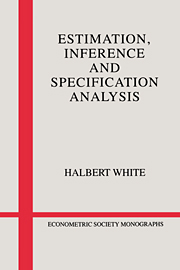Book contents
- Frontmatter
- 1 Introductory Remarks
- 2 Probability Densities, Likelihood Functions and Quasi-Maximum Likelihood Estimators
- 3 Consistency of the QMLE
- 4 Correctly Specified Models of Density
- 5 Correctly Specified Models of Conditional Expectation
- 6 The Asymptotic Distribution of the QMLE and the Information Matrix Equality
- 7 Asymptotic Efficiency
- 8 Hypothesis Testing and Asymptotic Covariance Matrix Estimation
- 9 Specification Testing Via m-Tests
- 10 Applications of m-Testing
- 11 Information Matrix Testing
- 12 Conclusion
- Appendix 1
- Appendix 2
- Appendix 3
- References
- Index
5 - Correctly Specified Models of Conditional Expectation
Published online by Cambridge University Press: 05 January 2013
- Frontmatter
- 1 Introductory Remarks
- 2 Probability Densities, Likelihood Functions and Quasi-Maximum Likelihood Estimators
- 3 Consistency of the QMLE
- 4 Correctly Specified Models of Density
- 5 Correctly Specified Models of Conditional Expectation
- 6 The Asymptotic Distribution of the QMLE and the Information Matrix Equality
- 7 Asymptotic Efficiency
- 8 Hypothesis Testing and Asymptotic Covariance Matrix Estimation
- 9 Specification Testing Via m-Tests
- 10 Applications of m-Testing
- 11 Information Matrix Testing
- 12 Conclusion
- Appendix 1
- Appendix 2
- Appendix 3
- References
- Index
Summary
Often, a complete specification of a model for a particular conditional density is unavailable, either because the theory describing the relationship between the variables of interest lacks sufficient power to describe the density of interest, or because interest only attaches to certain aspects of the conditional density. Usually, both these reasons underlie the way in which a particular specification is formulated. In this chapter we explore the consequences for the QMLE of ignoring or misspecifying features of the true conditional density that are not of direct interest.
Conditional Expectations and the Linear Exponential Family
Typically, interest in economics attaches to a fairly limited range of attributes of the conditional density, such as the conditional mean or the conditional variance. Because the conditional variance can be represented as the difference between the conditional mean of the square of the random variable of interest and the square of the conditional mean of that variable, we focus in this section on the properties of the QMLE as an estimator of the parameters of the conditional mean of Yt given Wt. Specifically, we seek to answer the question, “Under what conditions will the QMLE provide a consistent estimate of the true parameters of a correctly specified model of the conditional mean despite misspecification of other aspects of the conditional distribution?” We also consider the issue of interpreting the QMLE when the model of the conditional mean is misspecified.
- Type
- Chapter
- Information
- Estimation, Inference and Specification Analysis , pp. 62 - 87Publisher: Cambridge University PressPrint publication year: 1994



